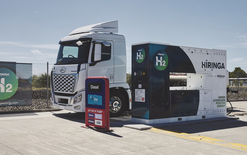German court could sink the value of diesel cars

Environmental group DUH has sued Stuttgart, Germany's car making hub, and Dusseldorf over levels of pollutant particles exceeding European Union limits. The emission scandal of 2015 led politicians across the world to scrutinise diesel emissions, which contain the matter and nitrogen oxide (NOx) and are known to cause respiratory disease. Environmental groups say levels of pollutants exceed the EU threshold in at least 90 German towns and cities. German states, where carmakers have a strong influence, appealed against the decision, leaving Germany's federal administrative court to rule on whether such bans can legally be imposed at local level. "The key question is whether bans can already be considered to be legal instruments," said Remo Klinger, a lawyer for DUH. "It's a completely open question of law." Paris, Madrid, Mexico City and Athens have said they plan to ban diesel vehicles from city centres by 2025, while the mayor of Copenhagen wants to ban new diesel cars from entering the city as soon as next year. France and Britain will ban new petrol and diesel cars by 2040 in a shift to electric vehicles. Evercore ISI forecasts a 5 percent fall in diesel residual values could result in a drop of NZ$2.3 billion in operating profit across eight European and U.S. carmakers. Analysts at Bernstein Research have said that diesel bans in Europe would hit French carmaker Peugeot hardest, followed by Renault. Among German carmakers, Daimler's global fleet exposure to diesel is around 38 percent, BMW's 35 percent and VW's 26 percent, Bernstein said in a report from 2016. Carmakers have sought to avert total bans by updating engine management systems to improve exhaust-treatment filters, a step only possible on vehicles equipped with software-based engine-management systems. Europe's love affair with diesel is already fading, with its market share in the European Union falling from 53.6 percent at the end of 2014 to 49.9 percent at the end of 2016, European automotive association ACEA's most recent data shows.





